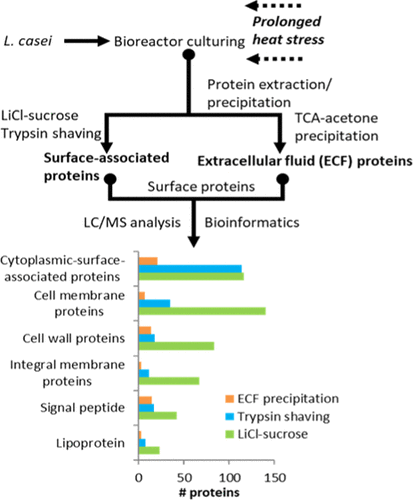当前位置:
X-MOL 学术
›
J. Proteome Res.
›
论文详情
Our official English website, www.x-mol.net, welcomes your
feedback! (Note: you will need to create a separate account there.)
Prolonged Heat Stress of Lactobacillus paracasei GCRL163 Improves Binding to Human Colorectal Adenocarcinoma HT-29 Cells and Modulates the Relative Abundance of Secreted and Cell Surface-Located Proteins.
Journal of Proteome Research ( IF 3.8 ) Pub Date : 2020-02-28 , DOI: 10.1021/acs.jproteome.0c00107 Kayode T Adu 1 , Richard Wilson 2 , Anthony L Baker 1 , John Bowman 1 , Margaret L Britz 1
Journal of Proteome Research ( IF 3.8 ) Pub Date : 2020-02-28 , DOI: 10.1021/acs.jproteome.0c00107 Kayode T Adu 1 , Richard Wilson 2 , Anthony L Baker 1 , John Bowman 1 , Margaret L Britz 1
Affiliation

|
Lactobacillus casei group bacteria improve cheese ripening and may interact with host intestinal cells as probiotics, where surface proteins play a key role. Three complementary methods (trypsin shaving [TS], LiCl-sucrose extraction [LS] and extracellular culture fluid [ECF] precipitation) were used to analyze cell-surface proteins of L. paracasei GCRL163 by label-free quantitative proteomics after culture to mid-exponential phase in bioreactors at pH 6.5 and temperatures of 30ºC to 45ºC. A total of 416 proteins, including 300 with transmembrane, cell-wall anchoring and secretory motifs, and 116 cytoplasmic proteins were quantified as surface proteins. Although LS caused significantly greater cell lysis as growth temperature increased, higher numbers of extra-cytoplasmic proteins were exclusively obtained by LS treatment. Together with increased positive surface charge of cells cultured at supra-optimal temperatures, proteins including cell wall hydrolases Msp1/p75 and Msp2/p40, α-fucosidase AlfB, SecA and a PspC-domain putative adhesin were up-regulated in surface or secreted protein fractions, suggesting that cell adhesion may be altered. Prolonged heat stress increased binding of L. paracasei GCRL163 to human colorectal adenocarcinoma HT-29 cells, relative to acid-stressed cells. This study demonstrated that prolonged heat stress influences cell adhesion and relative abundance of proteins located at the surface, which may impact probiotic functionality, and detected novel surface proteins likely linked to the cell cycle and envelope stress.
中文翻译:

副干酪乳杆菌的长时间热应激GCRL163改善与人结肠直肠腺癌HT-29细胞的结合,并调节分泌的和细胞表面定位的蛋白质的相对丰度。
干酪乳杆菌属细菌可提高奶酪的成熟度,并可能与作为益生菌的宿主肠道细胞相互作用,其中表面蛋白起着关键作用。三种互补方法(胰蛋白酶刮削[TS],LiCl蔗糖提取[LS]和细胞外培养液[ECF]沉淀)被用于通过培养后到中期的无标记定量蛋白质组学分析副干酪乳杆菌GCRL163的细胞表面蛋白。 pH为6.5且温度为30ºC至45ºC的生物反应器中呈指数相。总共416种蛋白质,包括300种具有跨膜,细胞壁锚定和分泌性基序的蛋白质和116种胞质蛋白质被量化为表面蛋白质。尽管随着生长温度的升高,LS引起的细胞裂解明显增加,但仅通过LS处理可获得更多数量的胞质外蛋白。加上在最适温度下培养的细胞增加的正表面电荷,包括细胞壁水解酶Msp1 / p75和Msp2 / p40,α-岩藻糖苷酶AlfB,SecA和PspC域推定的粘附素在内的蛋白质在表面或分泌的蛋白质中上调。分数,表明细胞粘附可能会改变。相对于酸胁迫细胞,延长的热胁迫增加了副干酪乳杆菌GCRL163与人结肠直肠腺癌HT-29细胞的结合。这项研究表明,长时间的热应激会影响细胞粘附和位于表面的蛋白质的相对丰度,这可能会影响益生菌的功能,并检测到可能与细胞周期和包膜应激有关的新型表面蛋白质。包括细胞壁水解酶Msp1 / p75和Msp2 / p40,α-岩藻糖苷酶AlfB,SecA和PspC域推定的粘附素在内的蛋白质在表面或分泌的蛋白质级分中均上调,表明细胞粘附可能改变。相对于酸胁迫细胞,延长的热胁迫增加了副干酪乳杆菌GCRL163与人结肠直肠腺癌HT-29细胞的结合。这项研究表明,长时间的热应激会影响细胞粘附和位于表面的蛋白质的相对丰度,这可能会影响益生菌的功能,并检测到可能与细胞周期和包膜应激有关的新型表面蛋白质。包括细胞壁水解酶Msp1 / p75和Msp2 / p40,α-岩藻糖苷酶AlfB,SecA和PspC域推定的粘附素在内的蛋白质在表面或分泌的蛋白质级分中均上调,表明细胞粘附可能改变。相对于酸胁迫细胞,长时间的热胁迫增加了副干酪乳杆菌GCRL163与人结肠直肠腺癌HT-29细胞的结合。这项研究表明,长时间的热应激会影响细胞粘附和表面蛋白质的相对丰度,从而影响益生菌的功能,并检测出可能与细胞周期和包膜应激有关的新型表面蛋白质。副酪蛋白GCRL163对人大肠腺癌HT-29细胞的作用,相对于酸应激细胞而言。这项研究表明,长时间的热应激会影响细胞粘附和位于表面的蛋白质的相对丰度,这可能会影响益生菌的功能,并检测到可能与细胞周期和包膜应激有关的新型表面蛋白质。副酪蛋白GCRL163对人大肠腺癌HT-29细胞的作用,相对于酸应激细胞而言。这项研究表明,长时间的热应激会影响细胞粘附和位于表面的蛋白质的相对丰度,这可能会影响益生菌的功能,并检测到可能与细胞周期和包膜应激有关的新型表面蛋白质。
更新日期:2020-02-28
中文翻译:

副干酪乳杆菌的长时间热应激GCRL163改善与人结肠直肠腺癌HT-29细胞的结合,并调节分泌的和细胞表面定位的蛋白质的相对丰度。
干酪乳杆菌属细菌可提高奶酪的成熟度,并可能与作为益生菌的宿主肠道细胞相互作用,其中表面蛋白起着关键作用。三种互补方法(胰蛋白酶刮削[TS],LiCl蔗糖提取[LS]和细胞外培养液[ECF]沉淀)被用于通过培养后到中期的无标记定量蛋白质组学分析副干酪乳杆菌GCRL163的细胞表面蛋白。 pH为6.5且温度为30ºC至45ºC的生物反应器中呈指数相。总共416种蛋白质,包括300种具有跨膜,细胞壁锚定和分泌性基序的蛋白质和116种胞质蛋白质被量化为表面蛋白质。尽管随着生长温度的升高,LS引起的细胞裂解明显增加,但仅通过LS处理可获得更多数量的胞质外蛋白。加上在最适温度下培养的细胞增加的正表面电荷,包括细胞壁水解酶Msp1 / p75和Msp2 / p40,α-岩藻糖苷酶AlfB,SecA和PspC域推定的粘附素在内的蛋白质在表面或分泌的蛋白质中上调。分数,表明细胞粘附可能会改变。相对于酸胁迫细胞,延长的热胁迫增加了副干酪乳杆菌GCRL163与人结肠直肠腺癌HT-29细胞的结合。这项研究表明,长时间的热应激会影响细胞粘附和位于表面的蛋白质的相对丰度,这可能会影响益生菌的功能,并检测到可能与细胞周期和包膜应激有关的新型表面蛋白质。包括细胞壁水解酶Msp1 / p75和Msp2 / p40,α-岩藻糖苷酶AlfB,SecA和PspC域推定的粘附素在内的蛋白质在表面或分泌的蛋白质级分中均上调,表明细胞粘附可能改变。相对于酸胁迫细胞,延长的热胁迫增加了副干酪乳杆菌GCRL163与人结肠直肠腺癌HT-29细胞的结合。这项研究表明,长时间的热应激会影响细胞粘附和位于表面的蛋白质的相对丰度,这可能会影响益生菌的功能,并检测到可能与细胞周期和包膜应激有关的新型表面蛋白质。包括细胞壁水解酶Msp1 / p75和Msp2 / p40,α-岩藻糖苷酶AlfB,SecA和PspC域推定的粘附素在内的蛋白质在表面或分泌的蛋白质级分中均上调,表明细胞粘附可能改变。相对于酸胁迫细胞,长时间的热胁迫增加了副干酪乳杆菌GCRL163与人结肠直肠腺癌HT-29细胞的结合。这项研究表明,长时间的热应激会影响细胞粘附和表面蛋白质的相对丰度,从而影响益生菌的功能,并检测出可能与细胞周期和包膜应激有关的新型表面蛋白质。副酪蛋白GCRL163对人大肠腺癌HT-29细胞的作用,相对于酸应激细胞而言。这项研究表明,长时间的热应激会影响细胞粘附和位于表面的蛋白质的相对丰度,这可能会影响益生菌的功能,并检测到可能与细胞周期和包膜应激有关的新型表面蛋白质。副酪蛋白GCRL163对人大肠腺癌HT-29细胞的作用,相对于酸应激细胞而言。这项研究表明,长时间的热应激会影响细胞粘附和位于表面的蛋白质的相对丰度,这可能会影响益生菌的功能,并检测到可能与细胞周期和包膜应激有关的新型表面蛋白质。











































 京公网安备 11010802027423号
京公网安备 11010802027423号